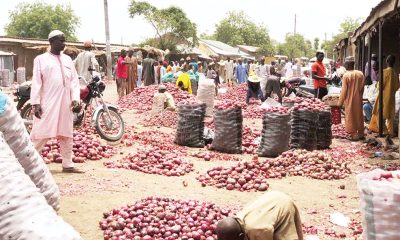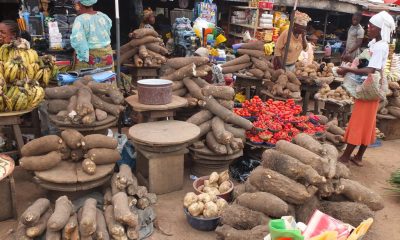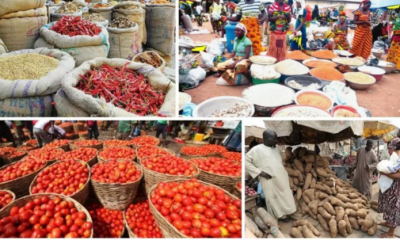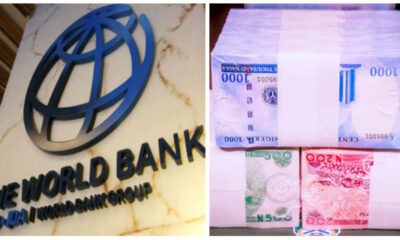Business
We increased interest rates 26.75% to stem inflation – Cardoso

We increased interest rates 26.75% to stem inflation – Cardoso
In response to mounting public frustration over Nigeria’s economic challenges the Central Bank of Nigeria’s (CBN) Governor, Yemi Cardoso, to insufficient diversification, has attributed the horror to insufficient diversification efforts, excess liquidity, and global economic pressure.
He stated this yesterday at a media briefing to mark the conclusion of the Monetary Policy Committee (MPC)’s 296th meeting in Abuja.
According to him, the MPC increased interest rates by 50 basis points from 26.25 per cent to 26.75 per cent in an effort to manage inflation.
The apex bank adjusted the asymmetric corridor from +100/-300 to +500/-100 basis points, Cash Reserve Ratio (CRR) of deposit money banks at 45 per cent and merchant banks at 14 per cent while retaining Liquidity Ratio at 30 per cent.
Justifying the decisions, Cardoso explained that the MPC acknowledged the detrimental impact of rising prices on households and businesses across Nigeria and reiterated its commitment to maintaining price stability,
He expressed optimism that recent monetary policy measures, coupled with fiscal interventions aimed at addressing food inflation, would help stabilise prices in the near term.
Cardoso highlighted the persistent challenge of food inflation, which is worsened by insecurity in key agricultural areas and high transportation costs, and emphasised the urgent need to enhance food supply within Nigeria.
READ ALSO:
- Nigerians have right to protest, Amnesty International tells FG
- Police arrest fleeing killer of Brigadier General in Abuja, recover pistol
- Republican lawmaker hits Kamala Harris with articles of impeachment
He said: “It was observed that while monetary policy has been moderating aggregate demand, rising food and energy costs continue to exert upward pressure on price development. The prevailing insecurity in food producing areas and high cost of transportation of farm produce are also contributing to this trend. Members were therefore not oblivious to the urgent benefit of addressing these challenges as it will offer a sustainable solution to the persistent pressure on food prices.
“Also noted in its consideration is the increasing activities of middlemen who often finance smallholder farmers, aggregate, hoard and move farm produce across the border to neighboring countries. The committee suggested the need to put in check such activities in order to address the food supply deficit in the Nigerian market to moderate food prices.
The MPC therefore resolved to sustain collaboration with the fiscal authority to ensure that inflationary pressure is subdued.
Reacting, Nigeria’s first professor of the capital markets Prof Uche Uwaleke said: “Having done 750 basis points between February and May this year, I had predicted they would do a minimum of 50bps or a max of 100bps in July.
“I am glad to note that they chose the floor which is a sign that a complete halt is most likely in their next scheduled meeting in September.
But the adjustment to the asymmetric corridor around the MPR is a major source of concern for me.
“The MPC communique did not provide any explanation for increasing the SLR from +100 to +500 and the SDR from -300 to -100.
“By implication, with an MPR of 26.75 per cent, banks will now get loans from the CBN at 31.75 per cent while they will be remunerated for their excess deposits at 25.75 per cent. This will further squeeze liquidity from the banking system and jerk up cost of credit with adverse consequences on output and the equities market.
“The MPC communique should have made it clear why it was better to mask the tightening in the asymmetric corridor than reveal it in the MPR.
“May I observe that unlike previous MPC communiques, recent ones are silent regarding how the members voted. This information is useful at this stage even before their personal statements are published.
“I submit that as far as taming the current elevated inflation in Nigeria is concerned in view of its major non-monetary drivers, the fiscal side holds the ace”, he said.
We increased interest rates 26.75% to stem inflation – Cardoso
Railway
Lagos Rail Mass Transit part of FG free train ride – NRC

Lagos Rail Mass Transit part of FG free train ride – NRC
The Nigerian Railway Corporation (NRC) has disclosed that the Lagos Rail Mass Transit (LRMT) trains are included in the Federal Government’s free train ride initiative for the Christmas and New Year celebrations.
The LRMT, which currently includes the Phase 1 Blue Line Rail and the Phase 1 of the Red Line Rail, operates under the Lagos Metropolitan Area Transport Authority (LAMATA).
This announcement was made by Ben Iloanusi, the Acting Managing Director of the NRC, during an interview on NTA News TV on Friday, following the launch of the initiative earlier that day.
While Iloanusi stated that Phase 1 of both the Blue Line and Red Line Rail projects are part of the program, LAMATA has yet to confirm this inclusion.
READ ALSO:
- Nigeria denies alleged plot to destabilise Niger Republic
- Navy arrests 19 Nigerians attempting to reach Europe by hiding on ship
- Troops arrest four Ambazonian rebels in Taraba
Iloanusi outlined the other routes benefiting from the scheme, which include the Lagos-Ibadan Train Service, Kaduna-Abuja Train Service, Warri-Itakpe Train Service, Port Harcourt-Aba Train Service, and the Bola Ahmed Tinubu Mass Transit in Lagos. Notably, little was previously known about the Bola Ahmed Tinubu Mass Transit service until this disclosure.
“Let me mention the routes where this free train service is happening. We have the Lagos-Ibadan Train Service, we have the Kaduna-Abuja Train Service, we have the Warri-Itakpe Train Service, we have the Lagos Rail Mass Transit trains, we have the Port Harcourt-Aba Train Service, and we have what we call the Bola Ahmed Tinubu Mass Transit, which is also in Lagos,” he stated.
Iloanusi provided operational updates, stating that passengers nationwide can access free tickets online or, for those unable to do so, at train stations where they will be profiled and validated.
He noted that passengers using NRC-managed services (excluding the Lagos Rail Mass Transit) should reserve tickets via the official website, www.nrc.gov.ng, with a valid ID required. He also advised travelers to plan, arrive on time, and bring valid identification.
Lagos Rail Mass Transit part of FG free train ride – NRC
Business
NNPC denies claim of Port Harcourt refinery shutdown

NNPC denies claim of Port Harcourt refinery shutdown
The Nigerian National Petroleum Company Limited (NNPCL) has denied claims in media reports that the newly refurbished Port Harcourt refinery has shut down.
The national oil company denied the claim in a press release issued by its Chief Corporate Communications Officer, Olufemi Soneye, on Saturday.
Soneye said the claim was false and urged Nigerians to disregard it. He stressed that the Port-Harcourt Refinery is fully operational.
READ ALSO:
- Like Ibadan, stampede claim 10 lives for Abuja Catholic church, 17 in Anambra
- Marketers react after NNPCL slashes petrol price to N899 per litre
- Electricity: We installed 184,507 meters, issued 50 licences in Q3, says FG
The statement read, “The attention of the Nigerian National Petroleum Company Limited (NNPC Ltd.) has been drawn to reports in a section of the media alleging that the Old Port Harcourt Refinery which was re-streamed two months ago has been shut down.
“We wish to clarify that such reports are totally false as the refinery is fully operational as verified a few days ago by former Group Managing Directors of NNPC.”
He noted that preparation for the day’s loading operation is currently ongoing, and added that claims of the shutdown are “figments of the imagination of those who want to create artificial scarcity and rip-off Nigerians.”
NNPC denies claim of Port Harcourt refinery shutdown
Business
CBN permits BDCs to buy up to $25,000 FX weekly from NFEM

CBN permits BDCs to buy up to $25,000 FX weekly from NFEM
The Central Bank of Nigeria (CBN) has granted Bureau de Change (BDC) operators temporary permission to purchase up to $25,000 weekly in foreign exchange (FX) from the Nigerian Foreign Exchange Market (NFEM).
The Central Bank of Nigeria (CBN) has granted Bureau de Change (BDC) operators temporary permission to purchase up to $25,000 weekly in foreign exchange (FX) from the Nigerian Foreign Exchange Market (NFEM).
This move, detailed in a circular dated December 19, 2024, is designed to meet seasonal retail demand for FX during the holiday period.
The circular was signed by T.G. Allu, on behalf of the Acting Director of the Trade and Exchange Department.
The arrangement will be in effect from December 19, 2024, to January 30, 2025.
Under the directive, BDCs may purchase FX from a single Authorized Dealer of their choice, provided they fully fund their accounts before accessing the market.
Transactions to occur at the prevailing NFEM rate
The transactions will occur at the prevailing NFEM rate, and BDCs are required to adhere to a maximum 1% spread when pricing FX for retail end-users.
READ ALSO:
- Badenoch’s negative portrayal of Nigeria Police unfair-PCRC
- Bitcoin price crashes to $95,000 as market continues to react to Federal rate cuts
- Bauchi high court dismisses blasphemy, cybercrime charges against Rhoda Jatau
All transactions conducted under this scheme must be reported to the CBN’s Trade and Exchange Department.
The circular read in part:
“In order to meet expected seasonal demand for foreign exchange, the CBN is allowing a temporary access for all existing BDCs to the NFEM for the purchase of FX from Authorised Dealers, subject to a weekly cap of USD 25,000.00 (Twenty-five thousand dollars only).
This window will be open between December 19, 2024 to January 30, 2025.
“BDC operators can purchase FX under this arrangement from only one Authorized Dealer of their choice and will be required to fully fund their account before accessing the market at the prevailing NFEM rate. All transactions with BDCs should be reported to the Trade and Exchange department, and a maximum spread of 1% is allowed on the pricing offered by BDCs to retail end-users.”
The CBN assured the general public that PTA (Personal Travel Allowance) and BTA (Business Travel Allowance) remain available through banks for legitimate travel and business needs.”
These transactions are to be conducted at “market-determined exchange rates” within the NFEM framework.
This initiative reflects the CBN’s strategy to stabilize the FX market and manage seasonal surges in demand.
CBN permits BDCs to buy up to $25,000 FX weekly from NFEM
-

 Railway12 hours ago
Railway12 hours agoLagos Rail Mass Transit part of FG free train ride – NRC
-

 metro2 days ago
metro2 days agoCourt stops customs from seizing imported rice in open market
-

 metro3 days ago
metro3 days agoFG transfers electricity market regulatory oversight in Lagos to LASERC
-

 metro2 days ago
metro2 days agoAfe Babalola: Court grants Dele Farotimi bail, barred from media interviews
-

 metro2 days ago
metro2 days agoIbadan stampede: Tinubu orders probe as death toll hits 40
-

 News2 days ago
News2 days agoAdebayo Ogunlesi, 2 other Nigerians make Forbes 50 wealthiest Black Americans list 2024
-
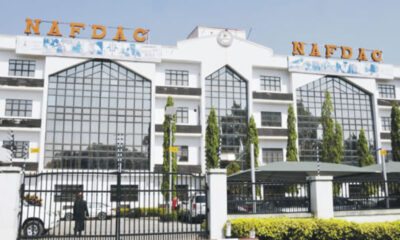
 metro2 days ago
metro2 days agoNAFDAC seizes N5bn fake rice, seals factory in Nasarawa
-

 metro3 days ago
metro3 days agoAbuja demolition: Soldiers attack FCTA officials, seize vehicles

